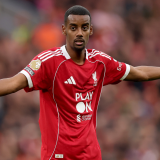Martin Odegaard's aggression in possession shows how Mikel Arteta is reviving Arsenal's attack
The Norwegian's importance to Arsenal's speedy attack was on full display on Wednesday in the Champions League

LONDON -- At their best on Wednesday night, Arsenal played in the sort of fashion that their critics (and a few of their supporters) have been craving. This was the Gunners at their zippiest, the ball flying up the field so that Viktor Gyokeres and Gabriel Martinelli could drive at the Olympiacos backline before it was settled. Better decisions when the chances really presented themselves, and this would have been a more comfortable night for Mikel Arteta's side, who had the odd shaky moment and plenty of clumsy finishes in the 78 minutes between Gabriel Martinelli's opener and Bukayo Saka's nerve-settler at the death.
It ought to be no surprise that these moments of prime Arsenal arrived on the night that Martin Odegaard returned to the XI, completing a full half of football for the first time since the opening weekend. What was supposed to be the year where the club captain had his "yeah, I'm thinking I'm back" season has been one of frustrating false starts. Determined to shake off a season spoiled by an ankle injury, Odegaard has looked much more like his old self when he has made it on the pitch. He just would have wanted more than eight minutes at St. James' Park or a quarter hour against Nottingham Forest to show what he can do.
Odegaard used that time effectively, his through ball inviting Gyokeres to wreak havoc on the Olympiacos backline, ramming a gap between the center backs, Venom pumping through his system. Kostas Tzolakis did well to parry a poked effort onto the post but Martinelli was on hand to turn in. After plenty more openings had been frittered away -- including by Odegaard, who twice managed to pick out an Olympiacos player with the goal at his mercy late on -- the captain got out his slide rule one last time, Saka's low drive finding the space between the goalkeeper's legs.
This will feel like a game where Arsenal diced with danger. On another day, it would have been a procession for a team with 16 shots and 2.73 expected goals.
Ultimately, an unnecessarily tight game was decided, at least in part, by moments of Odegaard's invention. So far, so familiar. What stood out, however, was how frequently the skipper went for these sorts of game-changing passes. The captain sets the tone for his teammates, and for the last two seasons, that has meant applying the slow chokehold to opponents. Arsenal would park themselves in your final third and get Odegaard in his two-man game with Bukayo Saka. Slowly, precisely, they would carve themselves an opening, teasing out the deficiencies in the other team.
That works pretty well for Saka, but it may not be quite as effective at unlocking Gyokeres, who was a wrecking ball through Portugal and Europe when Sporting got him a quick ball. If quick ball is what Gyokeres wants, then Odegaard would give it to him. When space emerged between the Olympiacos lines, he attacked it, demanding the ball from David Raya and springing it into dangerous areas with his first touch. A drop of the shoulder and a flick of the ball was enough for Gyokeres' legs to catch up with Odegaard's brain, a curling pass taking four Olympiacos defenders out of the game. If only the Swede had squared it to Martinelli, the second would have been secured much earlier. To be fair, Martinelli had gone alone a few moments earlier.
In pursuit of the killer ball, Odegaard was more prepared to gamble with possession than he often is. Over his Arsenal career, the Norwegian is an 87% passer, a number 10 who cherishes the ball. In the first half, when he was at his most scything in possession, only 77% of his passes found a red shirt. And that was great. It unlocked Gyokeres and Martinelli in a way they might not be if Arsenal tried to grind down a low block.
"I think we have to play to our qualities, and when we have a front three with that pace, with those timings in the runs, players can activate him, we have to do that 100 per cent," said Arteta. "He did it in Newcastle a few times in 15 minutes, and that's the game that I want from him.
"He has total freedom from my side to do and to explore and to take risks and to feel the movement away. He needs to generate those spaces and I think he's certainly done that in the last two games."
That this is the game Arteta wants from Odegaard seems significant. Like several other top sides, Arsenal seem determined this season to attack with more speed than in years gone by, to bypass the press and (more frequently) to get the ball in dangerous areas before their opponent has time to set their defense. As in the win at Manchester United on the opening day, the cannons were firing with remarkable regularity.
Arsenal's direct speed, the number of metres they advance the ball towards goal per second, was 1.71. The average for the last two Premier League seasons has been 1.12, significantly below the league average. A bit more basketball-y, perhaps, leaving the defense occasionally vulnerable, but when your defenders are that good and your attackers so threatening in opening space, it is easy to see why it is an approach Arteta wants to explore.
After all, on the basis of this game, it is one in which Odegaard can thrive. And any approach that encourages him to start pinging it promises to be very successful indeed.

















